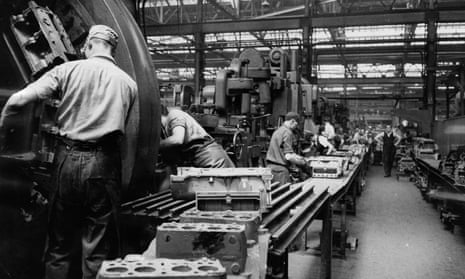Why can’t Britain make things any more? It’s almost a rhetorical question now, but keeps getting asked as one great manufacturing industry after another seemingly sinks into decline. George Osborne once promised a manufacturing revival that would supposedly see Britain “carried aloft by a march of the makers” yet we have slipped below France in the league tables for manufacturing output. Household names from Cadbury chocolate to Boots the chemist have been snapped up by foreign owners. The loss felt so keenly in former steel, shipbuilding or fishing communities isn’t just of jobs but of pride and prestige, a feeling the Leave campaign shrewdly tapped into with its promise to make Britannia once again rule the waves.
And at first glance What We Have Lost looks, with its red white and blue cover, like just another jingoistic addition to the nostalgic Brexiter canon. Yet it’s a much more complicated beast than that. Author James Hamilton-Paterson wastes no time before attacking the “hastily taken, ill-informed and unthought-through decision to leave the European Union after 44 years”, for a start. Similar scorn is reserved for the Keep Calm and Carry On brand of rose-tinted wartime nostalgia; born in 1941, the author associates skies “noisy with Spitfires, Hurricanes and Lancasters” with fear and loss rather than cheery blitz spirit.
And nor does he fall into the trap of romanticising the often gruelling, sometimes dangerous, unforgiving nature of postwar factory work. He quotes from Working for Ford, a blunt account by a young sociology student of what it was like working for the car industry in the 1960s, when you got six minutes maximum away from the production line to go to the toilet and the response to a man collapsing and dying in front of his co-workers was that “the foreman came across shouting ‘get to work … get on the line’” with the body lying in full view. No wonder, he suggests, the workforce grew resentful.
But this is definitely a book for those questioning how Great Britain lost its greatness, not whether it actually has, or even how greatness should be defined. Hamilton-Paterson doesn’t seem at all interested in the argument about whether it really is more noble, for example, to make things physically in a workshop than to serve people with them; to export cars than to export knowledge and skills. He is more absorbed in searching for a culprit. Why did the country that invented antibiotics, the jet engine, even the computer not manage to turn these developments more to its commercial advantage? What strategic mistakes and omissions led to greatness as he defines it slipping through our fingers?
The charge sheet he compiles is more local than global, ranging from supposed British snobbery about going into a “trade” rather than a profession to pig-headed management, Whitehall planning failures, union strife and our noted national ability to spend decades dithering over long-term infrastructure decisions such as expanding Heathrow airport. Hamilton-Paterson is a novelist as well as a non-fiction writer and the first four chapters are lyrically enough written to hold the general reader’s attention, although those old enough to feel a warm glow of recognition at the mention of a Morris Marina or Allenburys’ cereal packet will probably gain most from them. But as he moves into charting the struggles of specific industries from motorbikes to aerospace, things take a different turn.
Reader, I tried. But the density of detail in these chapters makes them strictly for aficionados, people who come to life at the whiff of an oily rag or mention of a Sturmey-Archer hub. Everyone else might as well skip to the howl of rage at the end, where the author decries the flogging off of British industries and even real estate to the highest foreign bidder and the loss of “a Britain that can never come again because so much that was original and characteristic has gone under the hammer for cash which has long since disappeared into the black hole of the national debt”. Brexiters shouldn’t be raging against Brussels, he suggests, but “Arabia and the Gulf States and Beijing and Kuala Lumpur, not to mention Dallas and Toronto and the unaccountable complexities of transnational hedge and pension funds”.
There’s not much here for anyone looking for a route map to making Britain great again. Those curious about how manufacturing might evolve in years to come, under the threat of automation or the promise of some jobs potentially coming back to Britain if the premium on cheap labour gives way to one on skills, will also be disappointed. This is a book of lost yesterdays, not possible tomorrows. But agree or disagree with Hamilton-Paterson’s definition of lost greatness, at least he doesn’t make the politician’s mistake of promising to bring back something that he privately knows is gone for good.

Comments (…)
Sign in or create your Guardian account to join the discussion